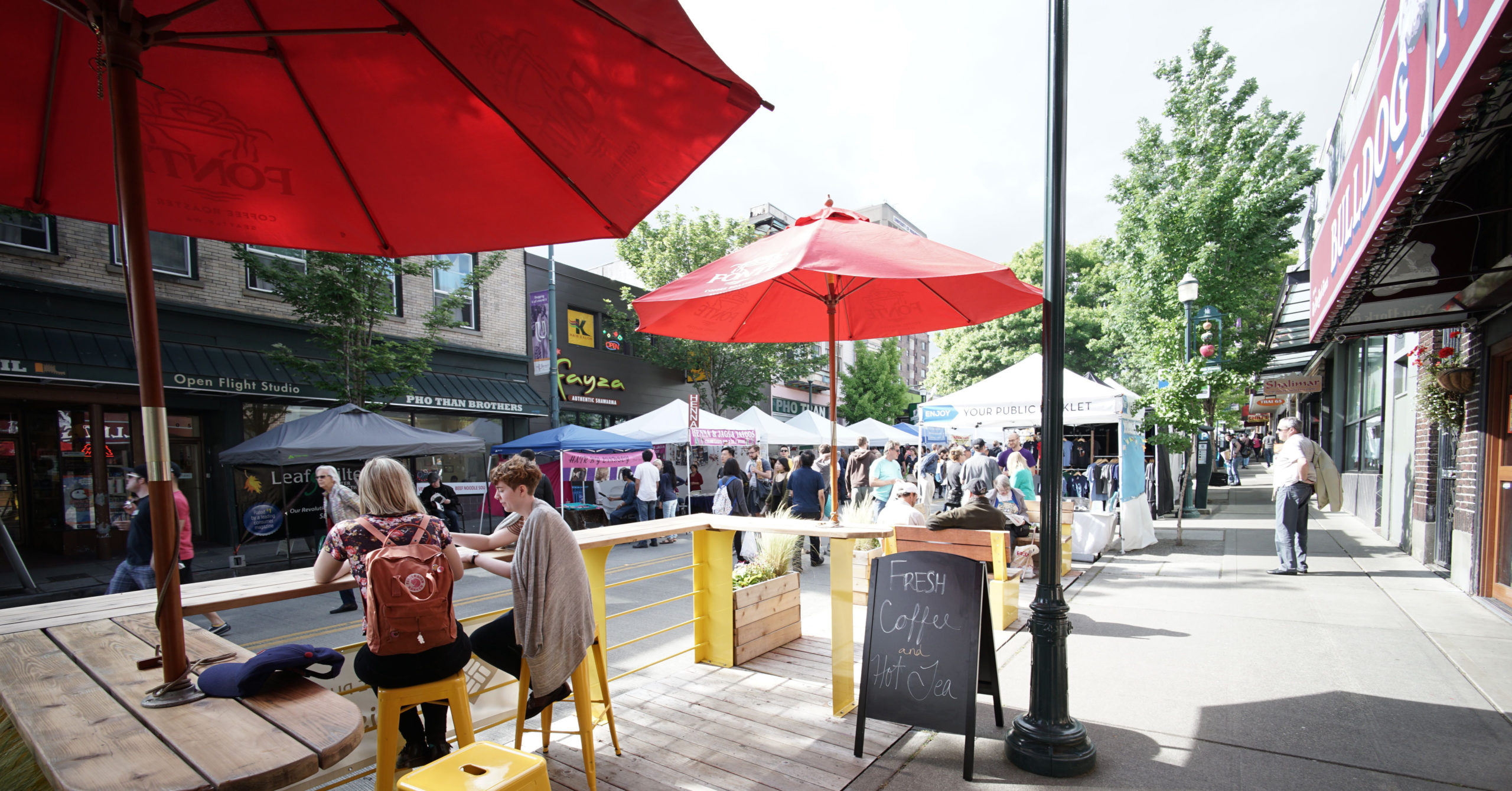
Investments include at least $1.2 million for community driven projects and up to $225,000 to 28 business districts throughout Seattle
Seattle (August 26, 2021) – Mayor Jenny A. Durkan and the Seattle Office of Economic Development (OED) announced $7.5 million in direct investments to support downtown and neighborhood economic recovery. Over 28 neighborhood business district organizations will receive up to $225,000 in funding to help stabilize small businesses and address community needs. These investments, which are in addition to direct assistance provided to small businesses through the Small Business Stabilization Fund, will support neighborhoods reopen, build e-commerce capacity, activate public spaces, address graffiti and vandalism, and promote community safety and community building events throughout their neighborhoods.
“Too many of our small businesses and neighborhoods have struggled during the pandemic. Since the initial days of COVID-19, we have worked to help small business owners and community organizations help keep their doors open. With funds from the American Rescue Plan Act, we can give our neighborhoods and small businesses the tools to build back better,” said Mayor Durkan. “As Seattle recovers from this pandemic, we must reactivate public spaces, restore neighborhoods, and bring our community back together.”
The Seattle Rescue Plan, launched in May, authorized $22 million in federal American Rescue Plan Act funds to aid Seattle’s local community recovery from the pandemic and the COVID-related economic impacts. The City prioritized funds from today’s announcement for business district organizations, community partners, and equity districts to help address the economic needs of the neighborhoods they serve. The following neighborhood business district organizations will receive a direct allocation:
- Alliance for Pioneer Square
- Ballard Alliance
- Beacon Business Alliance
- Belltown United
- Build Lake City Together
- Capitol Hill-Broadway BIA
- Capitol Hill Business Alliance/GSBA
- Central Area Collaborative
- Crown Hill Village Association
- First Hill Improvement Association
- For North Seattle
- Fremont Chamber
- Georgetown Merchants Association
- Green Lake Chamber
- Magnolia Chamber
- Mount Baker Hub Alliance
- Othello/MLK Business Association
- Phinney Neighborhood Association
- Rainier Beach Action Coalition/Economic Development Roundtable
- Rainier Avenue Business Coalition (Hillman City and Columbia City)
- Chinatown-ID: SCIDPDA/CIDBIA/Friends of Little Saigon
- SODO BIA
- South Lake Union Chamber of Commerce
- South Park Business District
- University District Partnership
- Uptown Alliance
- West Seattle Junction Association
- West Seattle Chamber
Investments include $6 million for neighborhood organizations across the City – including at least $1.2 million available to community, arts, culture, and business organizations as part of a new Neighborhood Economic Recovery Fund Request for Proposal (RFP). This also includes previously announced resources of$1.5 million to support downtown revitalization and workforce recovery.
“The inequities and disparities we saw exacerbated by COVID were seen in the experiences of individuals and families and collectively at the neighborhood level,” said Pamela Banks, Interim Director of OED. “In order for Seattle to have a truly inclusive economy, we must provide substantial recovery investments for our neighborhoods—particularly those who experienced the greatest economic, health and social devastation—to help our communities, businesses, and residents recover and thrive. This investment seeks to do just that by partnering with our organizations already doing this work, and welcoming the new ideas of others that are willing and ready to contribute to our collective recovery efforts!”
A $1.2 million Request For Proposals will be issued to support community, cultural or arts organizations, cultural districts, and small businesses such as community event producers, artists, consultants or a collection of individuals supporting neighborhood strategies with broadly shared benefits. Eligible applicants can submit project proposals to the Neighborhood Economic Recovery RFP for awards up to $100,000. Grants will fund recovery strategies and activities such as:
- Public and commercial space activations, including outdoor seating, retail/vendor markets, public art displays, music events, community events and commercial space pop-ups.
- Digital equity projects, such as neighborhood digital marketplaces for local small businesses.
- Communications infrastructure development to create websites, social media platforms, and contact databases to circulate community news and resources. These must share information local businesses and events to spur economic and social activity within a neighborhood.
- Physical improvements in neighborhoods, such as lighting, sidewalk cleaning, murals, or façade to improve the quality of a neighborhoods physical space for the benefit of businesses, residents and visitors.
- Community safety projects, including business block watches and community organizing.
- Outreach to support businesses and connect them additional resources such as technical assistance and building partnerships between community organizations, service providers and residents.
- Other economic recovery projects that are specific to a particular neighborhood’s needs.
“The Neighborhood Economic Recovery Fund is a lifeline to our communities who were some of the first in the nation to feel the severe impacts of the pandemic,” said Don Blakeney, Executive Director of the U District Partnership. “Vibrant and diverse neighborhoods like the U District have been particularly vulnerable, but with this critical bridge investment, we stand ready to roar back as employees and students return to campus in the fall.”
In recent weeks, Mayor Durkan signed $30 million Equitable Community Initiative task force recommendations into law, along with new legislation to allow more flexibility in permitted use for empty downtown storefronts. You can find more information on the City’s COVID-19 recovery efforts at www.seattle.gov/covidrecovery.
Individuals who need assistance completing the application, interpretation for the information sessions or have questions, please contact the Seattle Office of Economic Development at oed@seattle.gov or (206) 684-8090.